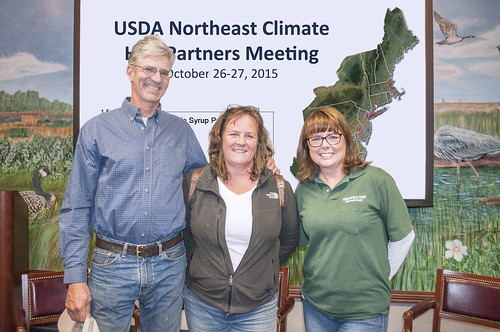
As the autumn leaves in the Northeast were just beginning to blanket the ground in late October, the USDA Northeast Climate Hub held its first annual –university network hosted– Partner Operational Discussions. The group convened in Annapolis, Maryland where working meetings were held at both the Chesapeake Bay Program and U.S. Fish and Wildlife Service Chesapeake Bay Field Office on October 26th and 27th, 2015. On the second day, after much conversation, assorted presentations and a locally sourced farm-to-table lunch from A Cook’s Cafe, the group took a step back to listen to those whose daily work has dictated the very mission of the USDA Climate Hubs: farmers. Maryland-rooted farm operators, Drew and Joan Norman of One Straw Farm and Catherine Webb of Springfield Farm, formed a panel with moderators Joana Chan and Allison Chatrchyan of the Cornell Institute for Climate Change & Agriculture. Together they chatted about their operations, experiences with extreme weather events, practices and information needs.
One Straw Farm, a family-owned and operated vegetable farm, provides families, restaurants and wholesalers with high quality sustainable produce and currently boasts 1,800 CSA members. In 1983, Drew Norman started the farm fresh out of college with a developed belief in the importance of organic farming for sustainable soil health. As the farm grew from 10 to 65 acres of crops, Drew remembers “extreme climate all thirty-three years.” Yet, he was quick to point out how extremely dry this past summer was after the “wettest six-week period ever experienced in (his) whole farming career.” As a vegetable farm, One Straw Farm is fully irrigated, but according to Drew, wet periods are worse than dry ones. “And I’m not farming on a sandy soil that drains well, so when I get six weeks of rain, I end up with disease issues, weed problems, and I end up not getting to get crops in the ground.” At the Norman household, the mantra is, ‘you can always add water; you can’t take it away,’ quips Joan.
Across the road, Springfield Farm, a free-range animal farm focused on raising chickens, turkeys, ducks, beef cattle and pigs with no steroids, antibiotics or growth hormones, has been in the family for 300 years. The farm practices rotational grazing (with the cows in front of the chickens), green manure, and composting. “If we don’t raise the meat, we won’t eat it,” says Catherine. The farm also uses a local feed company to not only reduce their carbon footprint, but to also better know what their animals are eating as “that’s what we eat, ultimately” explains Catherine. When asked about her experience with extreme weather events, Catherine said that, “when there’s extreme heat (our) egg production goes way down,” while more extreme cold events over the last few winters has led to frozen eggs. Overall, however, with a longer growing season trending in the Northeast, forage animals such as chickens can benefit as that means less time required for winter layer feed.
Joan Norman of One Straw Farm reminded the group that, “there’s always something new. Climate and the weather are a part of everyday life. You have to deal with what shows up tomorrow.” Nonetheless, Joan added in that “if we knew it was going to rain for six weeks, we first of all probably would not have believed anyone as it had never happened before (this summer), but if we had that information, we could have had a plan in place.” One Straw Farm further acknowledged the importance of their CSA program as it has carried them through “the really bad years, like the year it didn’t rain for 120 days, or the year that late blight wiped out the tomatoes overnight.” In that year, Joan managed to make kale everyone’s new favorite vegetable. Swiss chard is her next goal. Drew and Joan’s strategy of offering variety to consumers to maintain a strong business is also one that is shared by Springfield Farm, but in this case the egg came first. Today, in addition to egg sales, Catherine’s farm has expanded to also raise and sell poultry (primarily chickens and turkeys), beef, pork, and a variety of dairy products. The practice of crop and animal diversity by One Straw Farm and Springfield Farm demonstrates an effective and sustainable solution for greater economic security and resilience against the many costly impacts associated with climate change.
Based on the insights and stories shared that afternoon, the USDA Northeast Climate Hub is confident that these resourceful, ecological-minded farmers will continue to fine-tune their adaptive practices to better evolve within their communities and with the changes in climate. As liaisons to climate science information for agriculture and forestry within the region, the USDA Northeast Climate Hub looks forward to helping farmers like Catherine, Joan and Drew take their next steps in climate adaptation and mitigation planning and management.
